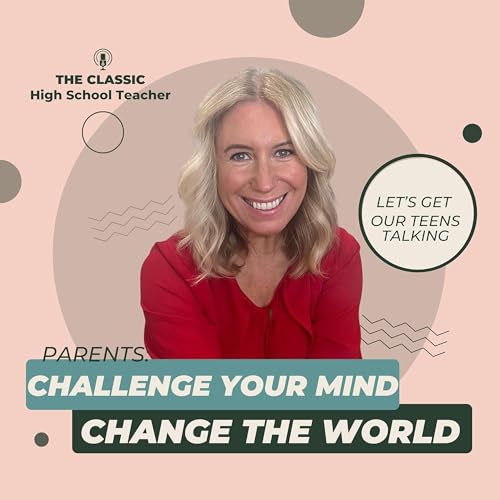
Challenge Your Mind, Change The World
Failed to add items
Add to basket failed.
Add to Wish List failed.
Remove from Wish List failed.
Follow podcast failed
Unfollow podcast failed
-
Narrated by:
About this listen
A Parent's Portal to Learn How to Develop Critical Thinking Skills at Home, Communication Strategies & How Young People Can Find Their Voice - collated from years of experience of a high school teacher.
Welcome to "Challenge Your Mind, Change the World" a podcast specifically designed for parents who are eager to foster a culture of critical thinking and academic excellence within their home. Hosted by The Classic High School Teacher, a seasoned English Literature, Drama, Social Studies and Ancient History teacher and a distinguished writer of teaching resources with over 20 years experience, as well as extensive experience in the business world, this podcast aims to bridge the gap between parental support, academic success and life beyond school for our next generation.
In today’s rapidly changing educational and business landscapes, the ability to think critically is not just a skill but a necessity for academic achievement and beyond. Each episode of our podcast delves into practical strategies, insightful discussions, and actionable advice on how parents can effectively encourage and nurture critical thinking skills in their teenagers as well as learning how to balance life out of school, and well being.
We focus on simplifying complex theories of critical thinking into manageable lessons that can be easily integrated into daily academic support, as well as other pressures currently facing teenagers and their families.
By listening to our podcast, you will discover:
- Expert techniques to enhance critical thinking and problem-solving skills in teenagers.
- Engaging methods to inspire a love for learning and intellectual curiosity.
- Tips for fostering effective communication and argumentation skills for academic essays and discussions.
- Real-world applications of critical thinking skills for academic success and lifelong learning.
- Preparation for life beyond High School
Join us on this journey to empower your teenager to excel both socially and personally by mastering the art of critical thinking. Together, we can lay a solid foundation for their success, not just in school, but in life.
-
 20 mins
20 minsFailed to add items
Sorry, we are unable to add the item because your shopping cart is already at capacity.Add to basket failed.
Please try again laterAdd to Wish List failed.
Please try again laterRemove from Wish List failed.
Please try again laterFollow podcast failed
Unfollow podcast failed
-
 15 mins
15 minsFailed to add items
Sorry, we are unable to add the item because your shopping cart is already at capacity.Add to basket failed.
Please try again laterAdd to Wish List failed.
Please try again laterRemove from Wish List failed.
Please try again laterFollow podcast failed
Unfollow podcast failed
-
 39 mins
39 minsFailed to add items
Sorry, we are unable to add the item because your shopping cart is already at capacity.Add to basket failed.
Please try again laterAdd to Wish List failed.
Please try again laterRemove from Wish List failed.
Please try again laterFollow podcast failed
Unfollow podcast failed


